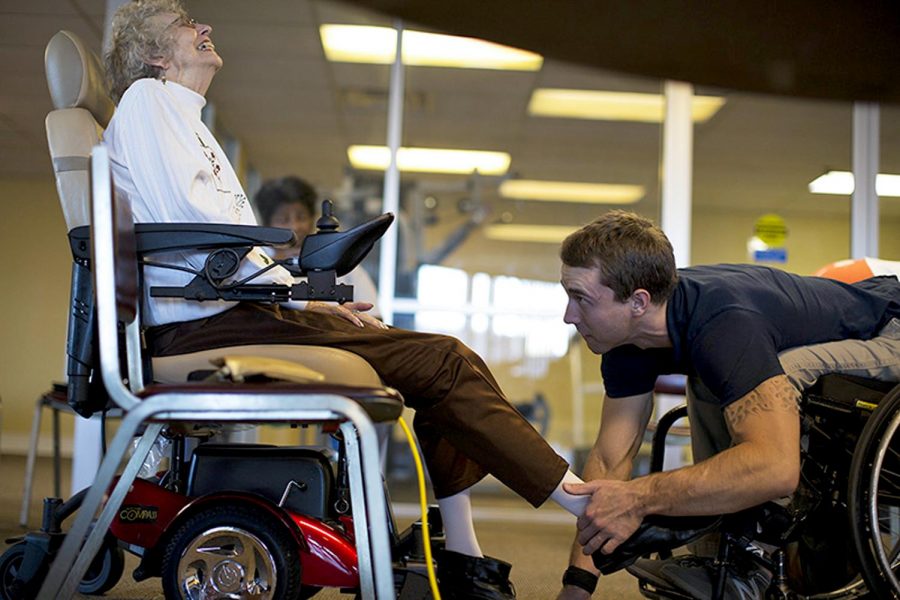Exercise program grows with addition of grants
September 4, 2017
An exercise program for elderly adults designed by a WKU faculty member has received two grants to help expand the program, according to the program designer.
The program, Bingocize, was designed by Jason Crandall to help promote physical fitness in elderly adults living in residential care, assisted living and independent living facilities. The program also helps improve cognitive and social abilities.
Crandall, associate professor of exercise science, said the two grants, one worth over $772,000 and the other worth $36,000, will help expand the program throughout Kentucky and the rest of the country.
“It’s kind of gone crazy,” Crandall said of the growth of the program.
Crandall said the program combines exercise and bingo, with participants performing exercises as they play bingo. He said participants improve both their physical fitness with the exercises and their cognitive abilities by focusing on the bingo directions.
Crandall said the $772,000 grant from the Centers for Medicare and Medicaid was awarded to Bingocize in May. He said the three-year grant allowed the program to hire a full-time program manager and a part-time employee in charge of the program’s data. The program was also able to hire four graduate assistants.
“I think an important part of that particular grant … is that we are working with nursing homes throughout the state and universities throughout the state,” Crandall said.
Crandall said he will serve as the program’s principle investigator and continue to secure more funding, and he is currently looking for grants to extend the program into Tennessee and Alabama.
The $36,000 grant came from Owensboro Health and will be used to implement Bingocize in Muhlenberg County, Crandall said. The one-year grant will buy tablets for the facilities to use when playing bingo and cover the cost of travel to the county. Part of the grant also allowed the program to hire a fifth graduate assistant.
Jean Neils-Strunjas, department head of communication sciences and disorders, worked with Crandall to secure the grants as a co-investigator. She said the grants will allow the program to continue to expand, and she hopes to see the program expand to 20 to 25 nursing homes and 1,000 residents in Kentucky.
“It could become more of a go-to program across the United States,” Neils-Strunjas said.
Neils-Strunjas said expanding Bingocize will benefit a greater number of elderly adults, particularly those with dementia. She said about 50 percent of nursing home residents have some form of dementia, and research has shown the progression of dementia can be slowed and challenging behaviors can be reduced. She said because Bingocize includes exercise, it has the potential to improve the lives of those affected by dementia.
Another positive component of Bingocize is the social aspect, Neils-Strunjas said. Residents who participate in Bingocize must interact with other residents, staff members and the students who are leading the program. Research has also shown social activities can improve the quality of life for those affected by dementia, Neils-Strunjas said.
Crandall said he started Bingocize while working at Kentucky Wesleyan College in 2011, when he sent a group of students to an assisted living facility to start an exercise program. He said when the students returned from the facility, they told him no one had attended the exercise program because bingo was being played at the same time. Crandall said that experience gave him the idea to combine bingo and exercise.
Crandall started working at WKU in 2013, and he brought the program with him. He said since joining WKU, he has been able to copyright the program with the help of WKU. He said the Office of Sponsored Programs has also helped him secure additional funding.
Cheryl Davis, associate provost for research and creative activity, said she has worked with Crandall.
“He’s very energetic,” Davis said. “It took a lot of persistence and commitment to win that very large award.”
She said the Office of Sponsored Programs supported Crandall throughout the entire process of applying for the grant. The Office of Sponsored Programs works with faculty members applying for grants by helping them identify potential sources of funding and ensuring they complete all application materials, according to Davis. Once the grant is received, the program helps set up the grant and communicates with the grant’s sponsors.
Crandall said he hopes to continue to receive funding in order to grow the program. The program is used in nine states, and Crandall is working with a group in Finland to start the program there. He said ideally, he would like to the program used in every state while continuing to spread internationally.
“That’s kind of my ultimate goal, so we’ll see,” Crandall said.
Reporter Emma Collins can be reached at 270-745-6011 or [email protected].













